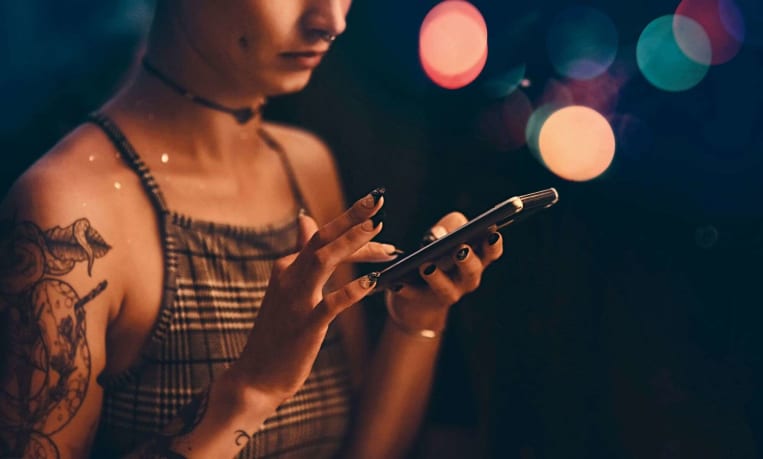
BBB Scam Alert: Celebrity impersonations get more sophisticated with AI technology

(Getty Images)
To trick you, scammers need to earn your trust first. What better way than by posing as a popular celebrity? Recently, BBB Scam Tracker has received numerous reports involving products supposedly endorsed by well-known and trusted celebrities. With the rise in deepfake scams and ever-improving AI technology, these phony endorsements are more convincing than ever.
How the scam works
You see a post on social media of a celebrity endorsing a weight loss product, health supplement, or another product. In the post, photos show the celebrity using the product, or a video features their voice talking about the amazing results they’ve seen. It sounds too good to be true, but the photos and video look so real! Also, the social media account appears to belong to the celebrity.
In a recent example, consumers reported receiving emails from what appears to be Kim Kardashian asking them to send her money to help the victims of the California wildfires.
Another scam included a scammer posing as celebrity chef Gordon Ramsay, and even Taylor Swift, endorsing free cookware. The link provided in the post was a counterfeit website where visitors were asked to provide payment details to cover shipping costs.
In another example, one consumer reported to BBB Scam Tracker that they ordered “Oprah Winfrey’s keto gummy bear supplements” after seeing a phony endorsement. They explained: “The ad showed Oprah’s face and featured her explaining the product and offering a first-time buyer discount of buy one bottle for $49 and get a second one free. I clicked on the link and put in my order. The next morning, I received an email stating my order had been processed for $198!” The company denied the customer a refund and shipped the product anyway. Upon arrival, they found the gummies were from a company that had no affiliation with Oprah Winfrey.
Before you make a purchase, take a minute to reexamine the post and social media account. The photos and videos are most likely fake. If you make a purchase, you’ll lose money (often more than you expected) on a product that is substandard or doesn’t exist.
How to spot fake celebrity scams
- Get familiar with deepfake technology. Scammers use deepfake technology to trick people. They take real video clips and photos of a person and use them to create new videos and audio clips. Deepfake images and videos can be surprisingly realistic. See this BBB article for tips on spotting deepfakes.
- Understand how AI-generated images work. With AI image generators, you can type in a few words describing the image you want to be created, and the AI generates an image based on your text. It’s valuable technology, but scammers can abuse it to create images to back up their stories, products, or outright lies. The point? Don’t assume a photo is proof that something is trustworthy.
BBB Accredited Businesses promise to adhere to BBB's Standards for Trust, so look for the BBB Accredited Business Seal. It's the Sign of a Better Business.
- Know that scammers often impersonate celebrities. Don’t assume celebrity posts, images, or videos are legitimate until you verify they came from an official source. Just because something is shared widely on social media does not mean it’s real. For example, an AI-generated photo of Pope Francis in a designer puffer jacket recently went viral. This deepfake video of Ukrainian President Volodymyr Zelenskyy telling his soldiers to surrender was also widely circulated on social media. Always do your due diligence before you purchase or reshare something you saw on social media.
- Only do business with companies you know and trust. If you want to purchase a product or donate, do so through a reputable business or non-profit. If you want to buy something from a company you aren’t familiar with, do plenty of research first. Look up the company name, website, and contact information. Read reviews on BBB.org and do a general search with the company’s name and the word “scam.” Don’t skip this step, even if you’re excited about the product. It’s the best way to protect yourself from fraud and identity theft.
The FTC has provided guidance on endorsements and the signs to look for when considering a purchase based on an endorsement.
For more information
Review BBB’s social media safety tips for more ways to stay safe. You may also want to read about a deepfake scam involving Elon Musk and learn about con artists using deepfake technology to create fake voicemail messages. Report an impostor account to Facebook.
Become a scam-spotting expert by subscribing to BBB's weekly Scam Alert emails.
For more about scams, go to BBB.org/ScamTips. If you have been scammed or targeted for a scam, help us warn others by filing a report at BBB.org/ScamTracker.
Still Need Assistance?
Contact Your Local BBB
Your local Better Business Bureau can assist you with finding businesses you can trust. Start With Trust®.
Additional Resources
Let BBB help you resolve problems with a business
Research and report on scams and fraud using BBB Scam Tracker
Learn more about the value of BBB Accreditation